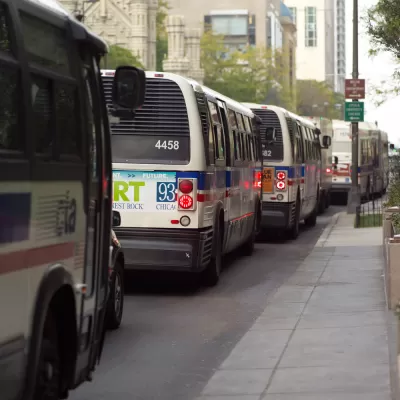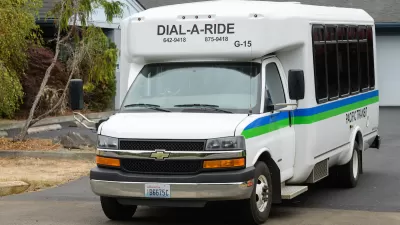Lawmakers and experts expressed varying levels of support for increased funding for transit systems.

In a hearing of the House Committee on Transportation and Infrastructure subcommittee on highways and transit, federal lawmakers and industry experts weighed in on the state of public transit in the United States.
Dan Zukowski describes the meeting in Smart Cities Dive, writing, “Experts from the transit industry and labor unions called for more federal funding for operations. Others recommended ways that transit agencies could adapt to changes in ridership such as schedules that provide more off-peak and weekend service.”
While some attendees called public transit an “essential service” requiring more funding and resources, one analyst called it a “niche” mode of transportation (while acknowledging that many transit riders have no other option). “[M.J. Maynard, CEO of the Regional Transportation Commission of Southern Nevada] said that public transit agencies have adapted to post-pandemic changes in commuting patterns due to hybrid and remote work arrangements by addressing specific community needs, such as riders who commute during off-peak hours, those with mobility disabilities and those in areas underserved by transit.”
Trending changes in transit operations include the addition of on-demand microtransit, which can help fill transit gaps in rural and less dense communities, but which some transit advocates say could drain resources from fixed-route options. Greg Regan, president of the AFL-CIO’s Transportation Trades Department. said “even the worst-performing bus routes are more cost-effective than microtransit,” and lawmakers should make “a renewed commitment to providing stable, flexible, and sufficient funding for transit operations.”
FULL STORY: Public transit in the post-pandemic world: Views diverge at congressional hearing

Planetizen Federal Action Tracker
A weekly monitor of how Trump’s orders and actions are impacting planners and planning in America.

Maui's Vacation Rental Debate Turns Ugly
Verbal attacks, misinformation campaigns and fistfights plague a high-stakes debate to convert thousands of vacation rentals into long-term housing.

San Francisco Suspends Traffic Calming Amidst Record Deaths
Citing “a challenging fiscal landscape,” the city will cease the program on the heels of 42 traffic deaths, including 24 pedestrians.

Amtrak Rolls Out New Orleans to Alabama “Mardi Gras” Train
The new service will operate morning and evening departures between Mobile and New Orleans.

The Subversive Car-Free Guide to Trump's Great American Road Trip
Car-free ways to access Chicagoland’s best tourist attractions.

San Antonio and Austin are Fusing Into one Massive Megaregion
The region spanning the two central Texas cities is growing fast, posing challenges for local infrastructure and water supplies.
Urban Design for Planners 1: Software Tools
This six-course series explores essential urban design concepts using open source software and equips planners with the tools they need to participate fully in the urban design process.
Planning for Universal Design
Learn the tools for implementing Universal Design in planning regulations.
Heyer Gruel & Associates PA
JM Goldson LLC
Custer County Colorado
City of Camden Redevelopment Agency
City of Astoria
Transportation Research & Education Center (TREC) at Portland State University
Jefferson Parish Government
Camden Redevelopment Agency
City of Claremont





























